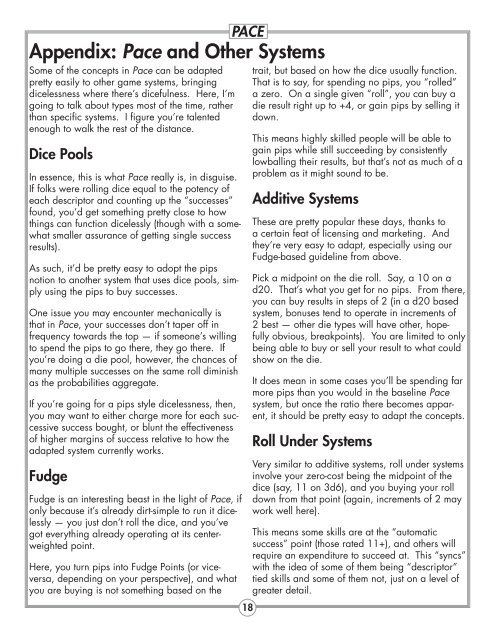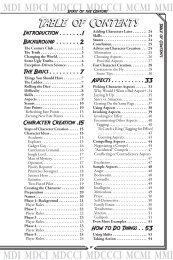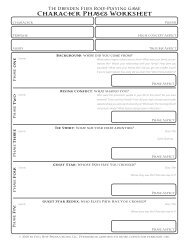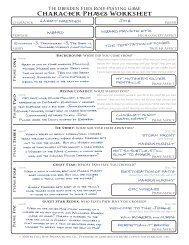Pace And Other Systemsâ¦.. - Evil Hat Productions
Pace And Other Systemsâ¦.. - Evil Hat Productions
Pace And Other Systemsâ¦.. - Evil Hat Productions
- No tags were found...
You also want an ePaper? Increase the reach of your titles
YUMPU automatically turns print PDFs into web optimized ePapers that Google loves.
PACEAppendix: <strong>Pace</strong> and <strong>Other</strong> SystemsSome of the concepts in <strong>Pace</strong> can be adaptedpretty easily to other game systems, bringingdicelessness where theres dicefulness. Here, Imgoing to talk about types most of the time, ratherthan specific systems. I figure youre talentedenough to walk the rest of the distance.Dice PoolsIn essence, this is what <strong>Pace</strong> really is, in disguise.If folks were rolling dice equal to the potency ofeach descriptor and counting up the successesfound, youd get something pretty close to howthings can function dicelessly (though with a somewhatsmaller assurance of getting single successresults).As such, itd be pretty easy to adopt the pipsnotion to another system that uses dice pools, simplyusing the pips to buy successes.One issue you may encounter mechanically isthat in <strong>Pace</strong>, your successes dont taper off infrequency towards the top if someones willingto spend the pips to go there, they go there. Ifyoure doing a die pool, however, the chances ofmany multiple successes on the same roll diminishas the probabilities aggregate.If youre going for a pips style dicelessness, then,you may want to either charge more for each successivesuccess bought, or blunt the effectivenessof higher margins of success relative to how theadapted system currently works.FudgeFudge is an interesting beast in the light of <strong>Pace</strong>, ifonly because its already dirt-simple to run it dicelessly you just dont roll the dice, and youvegot everything already operating at its centerweightedpoint.Here, you turn pips into Fudge Points (or viceversa,depending on your perspective), and whatyou are buying is not something based on the18trait, but based on how the dice usually function.That is to say, for spending no pips, you rolleda zero. On a single given roll, you can buy adie result right up to +4, or gain pips by selling itdown.This means highly skilled people will be able togain pips while still succeeding by consistentlylowballing their results, but thats not as much of aproblem as it might sound to be.Additive SystemsThese are pretty popular these days, thanks toa certain feat of licensing and marketing. <strong>And</strong>theyre very easy to adapt, especially using ourFudge-based guideline from above.Pick a midpoint on the die roll. Say, a 10 on ad20. Thats what you get for no pips. From there,you can buy results in steps of 2 (in a d20 basedsystem, bonuses tend to operate in increments of2 best other die types will have other, hopefullyobvious, breakpoints). You are limited to onlybeing able to buy or sell your result to what couldshow on the die.It does mean in some cases youll be spending farmore pips than you would in the baseline <strong>Pace</strong>system, but once the ratio there becomes apparent,it should be pretty easy to adapt the concepts.Roll Under SystemsVery similar to additive systems, roll under systemsinvolve your zero-cost being the midpoint of thedice (say, 11 on 3d6), and you buying your rolldown from that point (again, increments of 2 maywork well here).This means some skills are at the automaticsuccess point (those rated 11+), and others willrequire an expenditure to succeed at. This syncswith the idea of some of them being descriptortied skills and some of them not, just on a level ofgreater detail.






